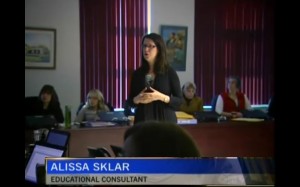-
Search It!
-
Recent Entries
- Civil discourse in difficult times is challenging but essential. Here are some tools.
- Pandemic parenting: 6 Ways to rethink screentime for kids & teens
- Fostering Respect & Civility Online: What Parents & Kids Need to Know
- In the News: Talking to CTV News About Kids, Screens, Gaming & Social Media
- When is a soda not a soda?
- Public Workshop: The Teenage Brain – a Practical How-to Guide for Parents
- Advice from a transgender kid, their parent & sibling
- Two parent presentations on digital parenting coming up in Montreal area
- Stranger danger online: What parents need to know
- iPhone and Android are tracking your locations: How, where and what to do about it
-
Links
- Canadian Mental Health Association – Eating Disorders
- Canadian Mental Health Association – Self-Injury
- International Centre for Youth Gambling Problems and High-Risk Behaviors
- McGill University – Define the Line
- Media Awareness Network – Be Web Aware
- Mental Health America — Depression in Teens
- NIAA Talk To Your Child About Alcohol
- NIAA Talk To Your Child About Alcohol
- Physicians for a Smoke-Free Canada
- Scarleteen
- The Canadian Don't Do Drugs Society
Tag Archives: bullying
Anti-bullying workshop tonight!
Comments Off on Anti-bullying workshop tonight!
Posted in Uncategorized
Things that make you go “hmmmm”
In my travels across the web, I come across some interesting articles about kids, technology, pop culture and high-risk activities. This post offers a selection of the stuff that caught my attention this past week, including stuff on Facebook, bullying, digital skills, eating disorders and risky behaviors in general.
In sharing these articles, I’m not necessarily endorsing them. Some offer compelling new research, but numbers can often be twisted to say what we want them to say. In reporting these statistics, the media often forgets that simple correlation does not necessarily imply causality. However interesting they are, it’s always helpful to maintain a critical perspective. One way or another, all of these pieces made me go “hmmmm….”
Schoolchildren can use an iPhone but cannot tie their shoelaces, poll finds
MANY schoolchildren are more confident using a DVD player or iPhone than tying their shoelaces, research claims.
As many as 45 per cent of children aged between five and 13 can’t tie their shoe laces – but 67 per cent can work a DVD player, according to a poll.
The study showed a large proportion can log on to the internet, play on computer games, use an iPhone or iPad and work satellite television services like Sky Plus.
But 65 per cent can’t make a cup of tea, while 81 per cent can’t read a map and 87 per cent wouldn’t be able to repair a bicycle puncture.
(Read the full article here.)
Teen sues over Facebook bullying
A teenager in Georgia has decided to take things into her own hands after her school and police said they could do nothing about the classmates bullying her on Facebook.
Fourteen-year-old Alex Boston and her parents are filing suit against two classmates and their parents for libel after the two classmates allegedly created a fake Facebook account in her name, using a photo of her that they distorted. The account was also used to post a racist video to YouTube that implied that Boston hated African-Americans, and to leave crude comments on the Facebook pages of other friends, suggesting she was sexually active and smoked marijuana.
American Teens: Live Fast, Die Hard
The teenage years should come with a warning label: Being an American teen may case early death.
At least, that’s the gist of a new study published in the British medical Journal “Lancet.” The study of teenage behavior in developed, higher income countries, indicates that U.S. teens tend to live faster and die harder than kids of the same age in other countries.
Americans between the ages of 10 and 24, smoke more pot, drink nearly as much alcohol and are more likely to die violent deaths, compared to young people in the same age group around the globe.
Beyond anorexia, bulimia: Lesser known eating disorders
For decades, the eating disorder lexicon had two main entries: anorexia and bulimia. But modern research reveals that these fall woefully short of encompassing the many facets of disordered eating. In the early ’90s, the American Psychiatric Association introduced a new diagnostic category: eating disorders not otherwise specified (EDNOS). A catch-all label that includes dozens of subdiagnoses, EDNOS applies to patients who don’t meet the exact criteria for anorexia or bulimia but still have very troubled relationships with food or distorted body images. Today, EDNOS diagnoses significantly outnumber anorexia and bulimia cases. “The atypical has become the typical,” says Ovidio Bermudez, M.D.
Comments Off on Things that make you go “hmmmm”
Posted in Articles
Tagged bullying, eating disorders, Facebook, risk, technology
The B-word: Why bullies need support and rehabilitation, not just punishment
Kids and teens who bully need our support, help rehabilitating and compassion, not thoughtlessly doled out punishments. If we want to help them grow up learning to interrelate with others without manipulation, harassment and abuse, we need to commit the resources and attitude to make that happen.
Because schoolyard bullies grow up to be workplace bullies. Or abusive parents and spouses. Or the person on the PTA or city council or condo co-op who makes life miserable for everyone else.
We all know people like that.
I recently enjoyed the privilege of working with CTV’s wonderful Cindy Sherwin on her excellent two-part investigative report on bullying, called The B-Word. This week’s installment (called “Putting an End to Bullying”), aired yesterday (March 15th) and focused on the ways schools and parents need to reframe their attitudes about bullies so we can make a difference.
We need to remember that kids and teens who are bullies are still growing up, and when we help them, we are also by extension helping all those who they have targeted (and those who might otherwise have been bullied by them in the future). We also need to think about the power we’ve given the word “bully,” and how this might undermine our best efforts to stop kids from hurting other kids (or adults).
Watch the full report here. You can also view Part 1 of “The B-Word” (which aired March 7th, 2012) here.
Posted in Uncategorized
Tagged bullies, bullying, compassion, punishment, rehabilitation, teens



